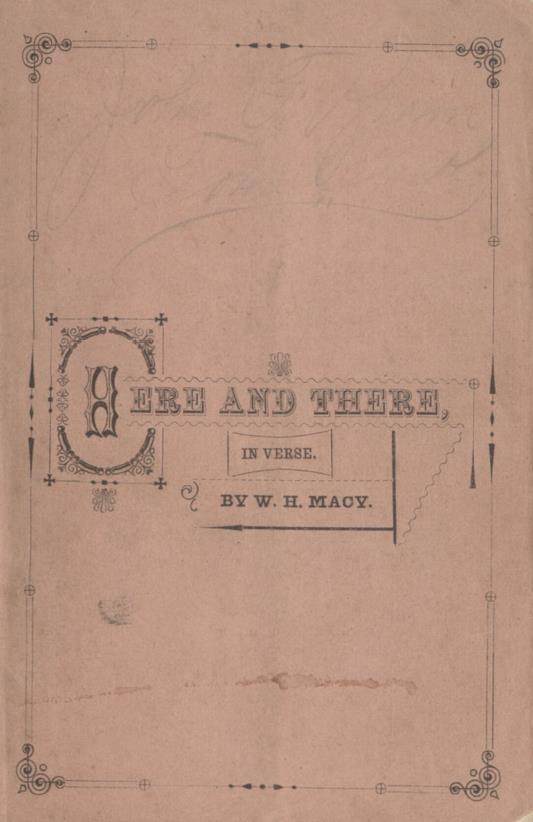|

|
|
HERE AND THERE,
IN VERSE.BY W. H. MACYNANTUCKET PRESS OF HUSSEY & ROBINSON – MAIN STREET. 1877.
|
|
Under the pressure of one of the most crushing of all physical infirmities, the author has found no little difficulty in reclaiming even this small number of the many fugitives which have escaped from his pen. (No pun is here intended.) Some of these have never before attained the majesty of print; some, as will appear by the dates, had more point and interest at the time than may now appear to the reader, while those of more recent date have been traced with pencil, 'mid the "Arctic night" of blindness, and afterwards revised by younger eyes. He hopes that his collection of odds and ends may prove a source of amusement to his many kind friends, as well as of some profit to himself. Nantucket, Mass., 1877. W. H. M.
|
CONTENTS*
* The contents page was not included in the original publication. Here it has been added by the editor. |
THE DISCOVERY OF THE NEW WORLD.1848.
|
|
6
|
|
7
|
|
8
|
|
9
|
|
10
|
|
12
|
|
13
——
THE "LEVIATHAN" STEAMER.1858.
|
|
14
|
|
15
|
|
16
THE INTERNATIONAL MATCH.1860.
|
|
17
|
|
18
TAKING THE STARCH OUT.1839.
|
|
19
|
|
20
THE "SCHOOL-HOUSE ON THE HILL."1869.
|
|
21
|
|
22
A DRUG IN THE MON(K)EY MARKETor
AN OLD STORY IN A NEW DRESS.
|
|
23
|
|
24
THE LAST WHALER.1873.Old Naughty-cus has been musing on the recent sale of the R. L. Barstow, and has strung out his musings into verse. He thinks the song contains both rhyme and reason; and though it may not be as good a "lay" as the "Lay of the Last Minstrel," or as truly poetical as the "Iles of Grease," we agree with him that it is more oleaginous than either.
|
|
25
|
|
26
Smythe is a housekeeper, and, inspired by his sufferings, has been courting the muses to some purpose; as witness the result:
|
|
27
|
|
28
A Boston Man announces that he has culled from the newspapers, the last two years, no less than forty- three different parodies of the "Heathen Chinee" Well, here goes for No. 44:
|
|
29
The machine got beyond our control in grinding this last stanza, and couldn't be stopped – which will account for some irregularities. ——
Jerusha Jenkins went to the Annual Meeting last week, as is evident from the "pome" she sends us. She must have been well disguised, or the lords of creation would have been horrified. She says her piece may be sung to the tune of "The King of the Cannibal Islands," whatever that may be:
|
|
30
|
|
31
——
Jerusha Jenkins is believed to be a traitor in the camp; and she will not be surprised to hear from one of her indignant sisters. Surely Mehitabel has a good right to be heard, though she boils over at the start, and then simmers down at the close. But let her poetic indignation speak for itself:
|
|
32
Mehitabel Sperry.
|
|
33
TAWTEMEO–A Fragment.
|
|
34
Derondamania.*Jerusha Jenkins thus ventilates her thoughts upon the new book, of which she has heard so much. She thinks she may be allowed the privilege of doing so, for she can't believe that all of those who talk and write about it, have ever read it through.
|
|
35
|
|
36
|
|
37
——
BLUE GLASS CURE.
|
|
38
|
|
39
——
Private Theatricals, by the Jenkins Family.
|
|
40
|
|
41
|
|
42
|
|
43
|
|
44
|
|
45
|
|
46
|
Source:William Hussey Macy, 1826-1891.
Images may be found at Nantucket Atheneum
or at Readex/America's Historical Newspapers.
Last updated by Tom Tyler, Denver, CO, USA, Apr 28, 2025.
|
|